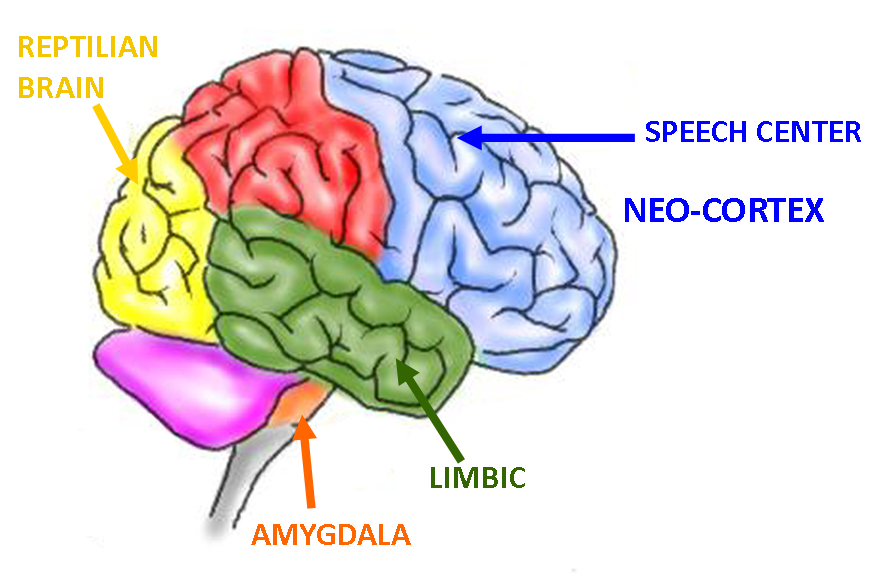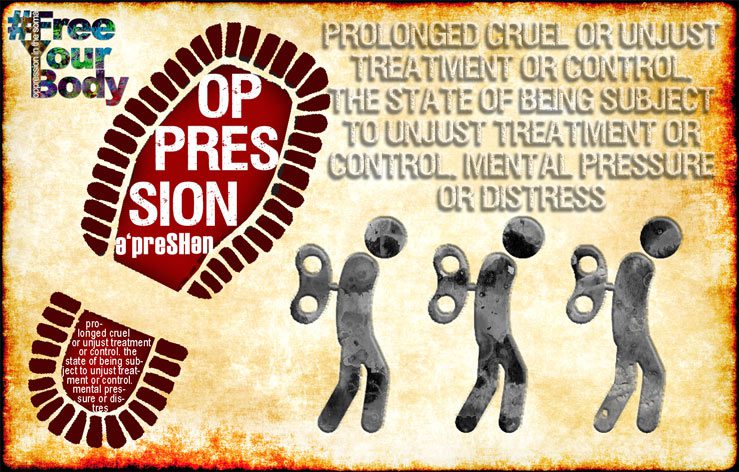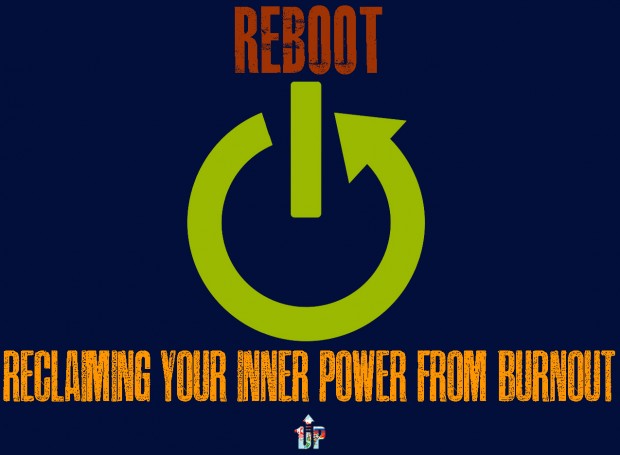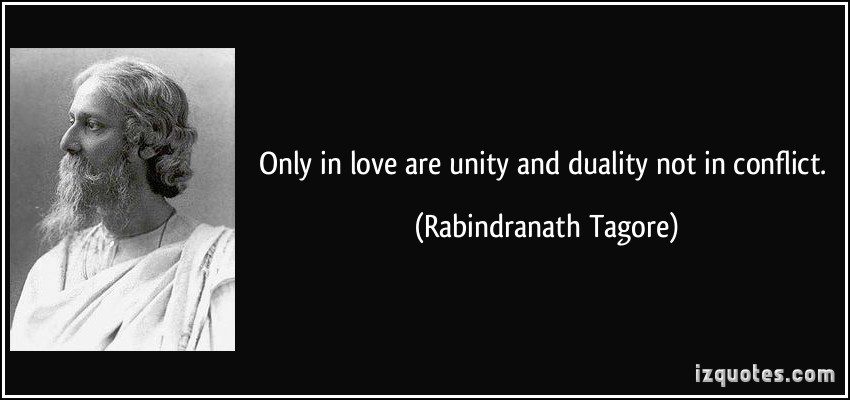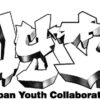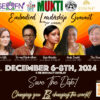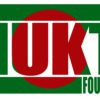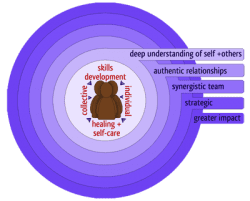
The “I” In “We”
The Need For Personal Growth in Organizational Development
By Rusia Mohiuddin
originally published in OD Network (Winter 2016 Vol. 47)
The focus in traditional organization development (OD) has often concentrated on collective practices, structure, and overall impact of the work based on internal alignment and effectiveness. Even today, with the explosion of transformative principles and practices, movement organizations, known for innovation, continue to sharpen internal processes in absence of developing deeper knowledge of individual leadership that makes up the collective. For the past ten years, my work with social justice organizations and networks, has concentrated on shifting this paradigm, seeking to acutely align organizational values and principles with the individual leadership that makes up the whole.
 In 2006, I pioneered the integration of somatics into an organizing framework resulting in a new, holistic model for community organizing known as Embodied Organizing. Somatics is a sophisticated methodology, universally transformative, combining the biological, physiological, and social sciences to provide a framework for individual and collective analysis and action. The term somatics is derived from the Greek work “soma”, which means the body in its living wholeness. The core ideology of somatics posits the undeniable interconnection and indispensable balance of mind, body, and mood both on the individual and collective levels.
In 2006, I pioneered the integration of somatics into an organizing framework resulting in a new, holistic model for community organizing known as Embodied Organizing. Somatics is a sophisticated methodology, universally transformative, combining the biological, physiological, and social sciences to provide a framework for individual and collective analysis and action. The term somatics is derived from the Greek work “soma”, which means the body in its living wholeness. The core ideology of somatics posits the undeniable interconnection and indispensable balance of mind, body, and mood both on the individual and collective levels.
Specifically, in the context of OD, somatics beckon us to see individuals as the make up of the collective and allows us to explore and understand the need for individual growth towards collective growth. In this, redefining the center of gravity for organizational capacity building, my work develops a path to see and adjust individual and collective patterns that directly inform external organizational strategies. My work found that the structural impact on organizations that prioritize individual leadership and self-care practices, develop a depth of trust and rapport among colleagues that radically allows for optimistic and achievably ambitious goal setting and heightened aligned confidence that drives increased team performance.
Movement folk tend to do this work because it connects deeply to their own beliefs that allow us to progress toward a world that uplifts our collective humanity through equity and justice. We do this work because it speaks so intrinsically to a deeper calling we may have that is grounded in empathy and compassion for all human beings. So, shouldn’t our work feel good? Shouldn’t our work be both individually and collectively generative? What happens as we develop embodied patterns of doing movement work over the years?
Service as self-neglect.
Often, my clients tell me, the measure of their effectiveness and impact is their ability to get their “hustle” on. They are commended only when their “hustle” leads to external impact that results in a successful action or meeting. Their “hustle” or ability/willingness to work incredible hours, often to their own physical and mental determent, is a requisite to performing their jobs well. This work, or hustle, has become imperative within our movements, as organizations, in order to remain competitive and relevant for funding, take on workloads far beyond their physical capacity. Ironically, this hyper focus on collective performance at the expense of, and in absence of individual growth and development, secretly disappears the acts of sabotaging an organization’s capacity for sustaining effective action. The constant push to hustle becomes increasingly ineffectual because we do not create balance that respects our need to replenish our physical, emotional, and mental health. Instead, individual deterioration leads to increased cynicism, diminished temperament, and trust within relationships, that result in decreased desire to do the work and our ability to collectively vision and take action.
Ultimately, our organizations become microcosms of the communities we serve, where the same cycle of self-neglecting service in which community members take on burdens of economic and social disparity to get by in life. Organizational teams mirror the effects of oppression, that negatively shape the communities we serve, reinforcing a lack of self-worth and cultivating mistrust in ourselves and others that inevitably recycle the wounds of oppression within ourselves and our relationships.
When we seek community change and empowerment, we do so through individual leadership development. Supporting the transformation of individual community members to reclaim their power and act on behalf of themselves. We understand that these individual community members must experience a personal arc of change that allows them to shed false narratives that impede their ability to take action and engage them in leadership development that provide the tools with which they take action. In this context, we understand the power of individual realization and growth as imperative to the development of collective power. Yet, most organizations do not make the natural leap that our organizations and our impact require the same investment in the individuals that make up the organization’s collective.
My consulting work seeks to dismantle this paradigm where the measure of organizational success is built on the hustle of individual team members. Instead, my work invites organizations to see individual growth as a critical component to organizational development. One of the key methodologies I use to espouse this principle is based on a tool I created called, “Building the Core”. This tool seeks to acutely align the values and principles of an organization with the collective actions of the team. The collective development of this exercise is always preceded with team members developing their own individual “cores” so as to inherently see how individual patterns deeply shape and impact the collective. We do this by identifying what emotions and values are cultivated that cyclically impacts what we literally think and what we practice.
The impact of this pedagogy has been multifold. The results of integrating somatics into OD allows us to see the parts that make up the sum. In so doing, organizations are able to:
- Uplift and respect the humanity of individuals while also increasing impact and efficiency. This is directly achieved by decreasing burnout so the work of individuals become more effective and take less time to accomplish;
- Cultivate authentic relationships, both internal and external, because the work of somatics allows us to feel ourselves more thereby increasing our ability to feel others;
- See where there are collective patterns that work against and/or are not intuitive to the work, allowing teams to somatically and intelligently chose to engage in more aligned practices; and
- Reclaim the joy and contentment that should inherently be a part of the privilege to live our purpose through what we do in the world.
I am constantly amazed by what organizations are able to achieve under the most egregious odds, both externally and of their own making. My desire and my own life’s calling require me to support organizations to cultivate individual and collective leadership so their success… our success, can be free of self-sacrifice and the fulfillment of our deepest yearnings for a better world.

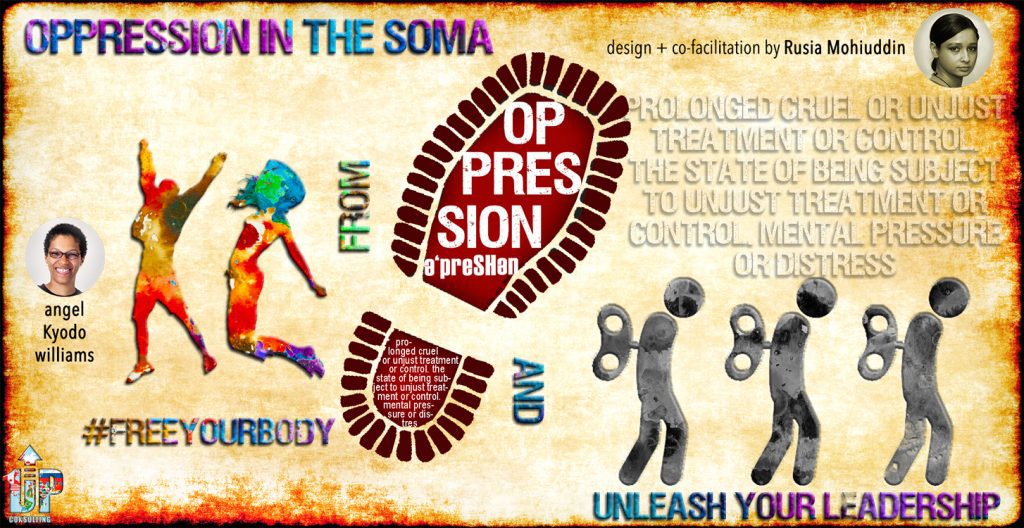
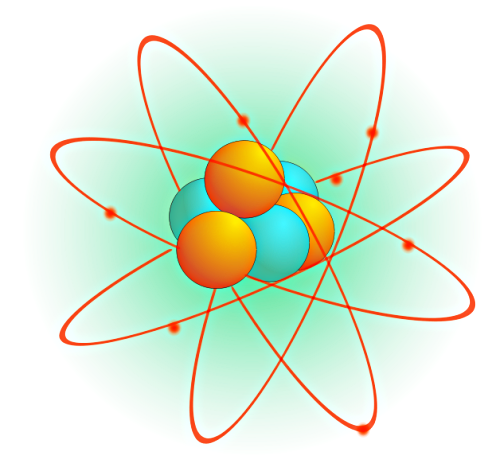 In the 5th century, Greek philosopher Democritus, first theorized that atoms are constantly moving. Today, we understand that these building blocks of matter are, in fact, in constant motion and that this activity produces energy.
In the 5th century, Greek philosopher Democritus, first theorized that atoms are constantly moving. Today, we understand that these building blocks of matter are, in fact, in constant motion and that this activity produces energy.
